As astonishing as this may now sound, industrial development far outran environmental regulation until surprisingly recently. However, by the early 1970s various issues—water pollution, air pollution, resource depletion, the alarming discovery that the main difference between polyester clothing and napalm is the absence of a spark—became so obvious that visionaries like Richard M. Nixon (later noted for innovations in hospitality services such as those offered by the Watergate Hotel) created agencies whose task it was to enforce environmental preservation laws. Presumably this was the end of the matter. Indeed, so confident am I that it was so that I will not even glance out the window to see if these efforts succeeded. No need to even smell the air.
Nevertheless, while nattering nabobs of negativism might have muttered about mass extinctions, anti-terraforming, and the potential self-extermination of the human species, one cannot deny that rising alarm about the changing environment inspired some classic SFF novels.
The Kraken Wakes by John Wyndham (1953)
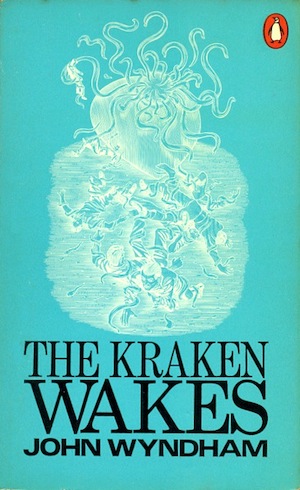
This cozy catastrophe stands out because it’s a rare book in which humans are not to blame for deadly environmental changes. The novel begins quietly, as a meteor shower splashes down in Earth’s oceans. English Broadcasting Company reporters Mike and Phyllis Watson, who document the escalating crisis, see nothing alarming. Initially.
Unfortunately for the former rulers of Earth, the objects were spacecraft, delivering the planet’s new owners to Earth’s oceans. At first these enigmatic beings limit themselves to sampling the inhabitants of an occasional village to better understand their new home. Once they’ve settled in—and particularly once humans attempt to nuke the settlers—the aquatic aliens decide to conduct planetary improvements. Which is to say, they begin melting ice caps, providing themselves with more aquatic lebensraum. This also drowns the coastlines where atom bomb-wielding, land-dwelling pests tend to congregate.
***
The Lathe of Heaven by Ursula Le Guin (1971)
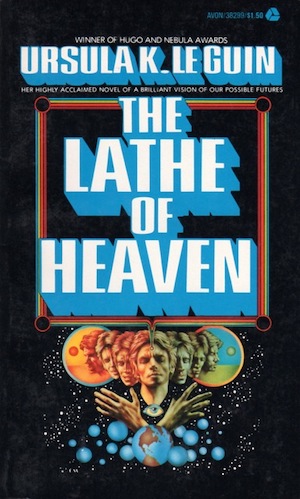
As he is dying in the aftermath of a nuclear war, George Orr discovers that he can dream away the current world, replacing it with a better one. Unfortunately for George, “better than a world in which he is badly burned and waiting to die” is a low bar. The world that replaces the war-torn one is overheated, overpopulated, and marching towards the same mass suicide as George’s original world.
Enter Dr. William Haber. Assigned George as a patient, Haber accepts the reality of George’s dream power. With applied hypnotherapy, Haber sets out to use George as a tool with which to improve a sadly flawed world. What if unforeseen complications of Haber’s fixes present themselves? Well, Haber will simply try again, for as long as it takes to create a perfect world.
***
The Magic Goes Away by Larry Niven (1978)
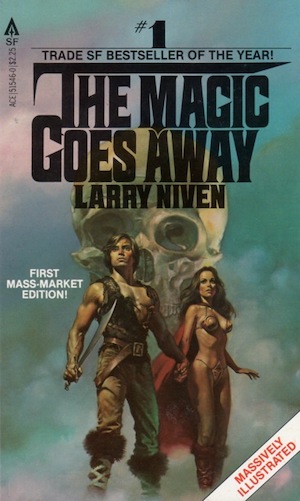
Years ago, the Warlock stumbled across the fact that doomed his magic-rich world. Every mage worth the name cheerfully used the world’s mana to work their spells. The Warlock was the first one to realize that mana was what another age called a non-renewable resource. Once the current reserves were depleted, that would be that for the age of magic. The sword-wielding barbarians would win.
Wizards can look for new lands with as-yet-untapped mana, but Niven’s mages are an implausibly unreasonable lot and they will quickly squander new but finite sources of mana. Very few sorcerers have the self-control to ration limited supplies of mana. It would be best to find some source of mana that even careless humans could not use up. Nowhere on Earth fits the bill. The age of magic appears to be doomed by human folly.
Earth is only one world. To find an unending frontier, one need only look up at the Moon and worlds beyond. What could go wrong?
***
A Greater Infinity by Michael McCollum (1982)
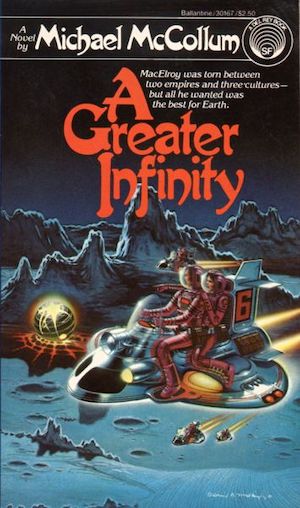
Unremarkable Arizona State University engineering student Duncan MacElroy set out to purchase beer. Thanks to his unfortunate choice in beer-run companions, Duncan ended up drafted into paratime war between worlds occupied by Homo sapiens sapiens and worlds occupied by Homo sapiens neanderthalensis. Violent death in this setting was far more likely than it would have been had Duncan remained on Earth. But life was certainly more exciting.
While the Confederation, Duncan’s adopted civilization, accrues many benefits from an endless frontier of parallel worlds, there is a cost. Which is that, ruling so many worlds, there is no reason to value any particular world. Thus, industrialized worlds are polluted to a degree that would make a Victorian industrialist pale. Unlike Earth, where being constrained to a single world ensures environmentalism out of simple, logical self-interest, the abundant frontiers mean environmental regulations will always be a nonstarter in the Confederation.
***
The Sheep Look Up by John Brunner (1972)

Despite the best efforts of runaway consumerism, the world depicted in Brunner’s The Sheep Look Up is not a utopia. Indeed, it is the very opposite, faced with every possible consequence of short-sighted, ravenous pursuit of wealth. Oceans are poisoned, the air is thick with smog, entire species are vanishing, and the American president, from whom one surely would expect wisdom (…or at least prudence), can offer only snappy platitudes rather than clear-sighted public policy.
Simple logic dictates that an intelligent species presented with the certainty of self-inflicted catastrophe and mass extinction would embrace the necessary steps to sidestep doom. I regret to report Brunner’s humans do not qualify. Too few are motivated to take constructive actions. Indeed, some see environmental degradation as just another money-making opportunity. Small wonder that the novel ends on this gloomy note:
Mrs. Byrne sniffed. Smoke! And if she could smell it with her heavy head cold, it must be a tremendous fire!
“We ought to call the brigade!” she exclaimed. “Is it a hayrick?”
“The brigade would have a long way to go,” the doctor told her curtly. “It’s from America. The wind’s blowing that way.”
The conceit that the smoke from fires would be noticeable thousands of kilometers away is a bit silly, of course [Editor’s note: cough cough], but in Brunner’s hands the final image is quite effective.
***
As I said, there are a great many SFF books with environmental themes. Even though our laws must have forestalled crises of the sort we feared in the 1970s, authors have continued writing such works. Since this list is limited to five books, and many is probably larger than five, there must be quite a few worthy books I did not mention. Comments are below.
In the words of Wikipedia editor TexasAndroid, prolific book reviewer and perennial Darwin Award nominee James Davis Nicoll is of “questionable notability.” His work has appeared in Publishers Weekly and Romantic Times as well as on his own websites, James Nicoll Reviews and the Aurora finalist Young People Read Old SFF (where he is assisted by editor Karen Lofstrom and web person Adrienne L. Travis). He is a four-time finalist for the Best Fan Writer Hugo Award and is surprisingly flammable.










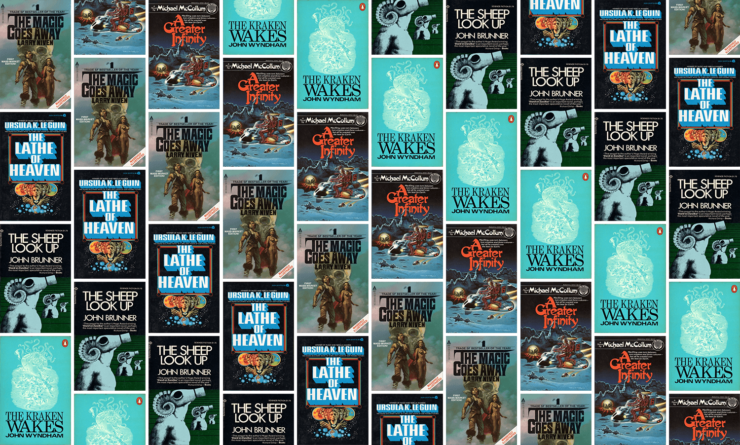
The Kraken Wakes is a fantastic book. Re-read it last year and it holds up well.
_The Magic Goes Away_ universe: one very cool short story, one pretty good novella, one mediocre novel, and a book of entirely forgettable shared-universe stories.
and it’s a shame, because that was one of Niven’s neater ideas, and there was surely much more that could have been done.
Doug M.
If “The Sheep Look Up” came out today, billed as a near-future SF story, I would dismiss it as being just too obvious and didactic about contemporary problems. Obviously society would pull its collective heads out of its collective asses and deal with the worst problems before they came to such an extreme state…
2: I think you’re forgetting Niven and Pournelle’s… let’s go with remarkable … Golden Road novels, which are certainly examples of the sort of thing they are examples of.
I seem to recall a little known and rather short fantasy (only three volumes, if you can imagine that) in which some people called “hobbits”, not impressed with recent improvements to the landscape, claim that all they really want is clean air and water and a bit of sunlight.
Don’t know why I’m thinking of that now, everything is fine.
I’m a few chapters into a re-read of Lathe of Heaven. At this point, at least, George hasn’t been affected by nuclear war, though pollution and global warming are significant problems.
To find an unending frontier, one need only look up at the Moon and worlds beyond. What could go wrong? Well, wearing that brass bikini on the moon might prove difficult.
Currently loving Catherynne Valente’s The Past is Red.
Not all novels:
“The Star” by H. G. Wells. A new star enters the Solar System and I think plops into the Sun, after buzzing the Earth with no consequences of significance detected by scientists observing from Mars.
The world of “Do Androids Dream of Electric Sheep?” appears to be biologically ready for the last rites, but the story isn’t about that.
Presenting BBC radio series “Elon Musk: The Evening Rocket” today – part five of five – Jill Lepore commented at length on Garrett P. Serviss’s “The Moon Metal”, which I’ve just kind of spoiled. Actually, only one paragraph, containing the word “robber”, describes the catastrophe. You can read it from Project Gutenberg: I might even pay you.
@@@@@ 7
Well, wearing that brass bikini on the moon might prove difficult.
That’s a hilariously inappropriate cover. The interior illustrations by Esteban Maroto (which fleshed out the page count so that the published book was short-novel length instead of long-ish novella) are lovely and generally track the story quite well, except for consistently removing most of the clothes from the female wizard character.
(I re-read it a couple of years ago, and quite liked it.)
How about Conan Doyle’s The Poison Belt? Though it’s not a permanent environmental disaster…
Hal Clement’s The Nitrogen Fix seems like a candidate, although I gather the “disaster” was described as some sort of almost-inevitable stage in planetary evolution.
Release the kraken!
Sorry, somebody had to say it.
The conceit that the smoke from fires would be noticeable thousands of kilometers away is a bit silly, of course
I appreciate the irony, but the fact that the smoke of fires burning in Australia could reach New Zealand was a memorable shock down this waya year or two ago. That was over 2000km away, and we had surreal orange skies and tainted snow in the mountains.
Really? No mention of JG Ballard? The Drowned World, The Burning World, The Crystal World, and The Wind from Nowhere — four tales of the environment gone mad, somewhat surrealishly, to be sure, and elemental in the forms of (respectively) water, fire, earth, and air.
Good times.
I would highly recommend Neal Stephenson’s Zodiac. Not his best known book by a long ways but it is very good and surprisingly for Stephenson, offers a satisfying ending. Basically follows a bunch of misfits trying to take down illegal dumping and other industrial damage. Kind of like Twister if the crew were renegade environmentalists instead of storm chasers.
Mother of Storms, by John Barnes, 1994. An undersea nuclear explosion triggers the release of vast amounts of methane previously trapped in methane clathrate (“methane ice”). The extra atmospheric methane triggers in its turn world-ranging superstorms, killing billions. Best Novel nominee for both Hugo and Nebula.
I’ve read 4/5 of these, which may be a record for the series. I’m only missing A Greater Infinity, which I have to say does sound fascinating. I’ll pick a copy up. The Sheep Look Up is, of course, the prize here. I think it’s the most prescient science fiction novel that I’ve ever read, which should give a pretty good indication of how cynical I am regarding humanity. I make Thomas Ligotti look like Barney the purple dinosaur.
The conceit that the smoke from fires would be noticeable thousands of kilometers away is a bit silly, of course.
I’m assuming sarcasm on your part.
https://www.space.com/wildfire-smoke-satellite-images-us-canada
Towards the end of his life, Philip Wylie’s SF output dealt heavily with environmental disaster.
A script he wrote for a 1971 episode of The Name of the Game (a series otherwise set in the then present day), because of its science fictional character, was framed as a dream/nightmare episode set in 2017 (?!?!). He almost simultaneously wrote a novelization of the story, Los Angeles: A.D. 2017. The TV episode is notable also for being directed by a young Steven Spielberg.
You can also look up his 1972 novel The End of the Dream, published posthumously (which may explain its choppy format and mixed reception). At least one edition (DAW, 1973) has an introduction from John Brunner.
@18
Wasn’t the coughing a bit of a give-away?
@20 You’re right. Serves me right for reacting to another comment (#13) rather than scrolling back up to the original quote.
4) Re the Magic Goes Away universe — D’oh, James, you’re right — I blotted those right out of memory. And there were a couple of other short stories by Niven, too, that were either mediocre or dire.
Again, a darn shame — a fine high concept, a good start, then fell off a cliff.
Doug M.
Pretty much everything by Peter Watts qualifies bur the Rifters series in particular.
A bit surprised not to see it on the list since Peter Watts is apparently very happy about “Whenever I find my will to live becoming too strong, I read Peter Watts. – James Nicoll”, see https://rifters.com/real/author.htm
In 92, Tor published GLASS HOUSES by (disclaimer—my spouse) Laura J Mixon, a cyberpunkish novel about telepresence set in a a definite climate change future.
Bruce Sterling’s Heavy Weather comes to mind, although as a 1994 book it’s not really early enough for this discussion.
No one listed my favorite “Earth” by David Brin
it was written later (1990) but it does a great job of tracking a lot of trends , not only in anthropogenic climate change , but trends in our lives and society and how they might contribute to those disasters as well…if you have a chance try it out
@14 I too completely expected to see JG Ballard on this list.
Even if it wasn’t intended that way, it’s possible to read Flynn, Niven & Pournelle’s Fallen Angels as an ironic reversal of what’ s happening now: global cooling is threatening civilization, and people who started out as just liberals and hippies (plus their assorted remoras) are standing in the way of doing anything about it because of absolute adherence to an authoritarian and reality-divergent ideology and also because they care more about their personal fiefdoms; meanwhile, public education having been destroyed as an agent of reason, various mobs are doing a lot of their dirty work.
What about Heinlein’s 1966 ‘Moon is a Harsh Mistress’? The unbalanced ecology causing impending death by water shortage is the spark which drives the revolution, the plot line for the book.
David Brin , elevation wars
sorry,
David Brin’s Uplift Universe
A couple of years ago, I discovered that the British The Kraken Wakes is substantially different than Out of The Deeps, the novel as published in the USA. You should read both.
A favorite of mine is “Make Room, Make Room!” by Harry Harrison. It has a possible consequence of unchecked population growth. It was the source for the movie “Soylent Green”.
What about FLOOD by Stephen Baxter? True, the source of sea level rising is a Deus ex Atlantic Rift, and I don’t think sending a pregnant woman into a high gravity situation (however limited in length) is going to turn out well, but it’s still a good novel about the evolution of the Hydrocene Age.
This prompted me to dig “Don’t Pick the Flowers”, 1971, D. F. Jones, out of my book piles and give it a re-read.
Off shore exploratory drilling opens a massive bubble of Nitrogen stored under the crust. No explanation of how it got there. All the geologists in the book are puzzled as well. It’s enough to noticeably reduce the oxygen content in the atmosphere, especially before it gets a chance to mix properly.
Since the drilling was close to the Californian coast, the eventual collapse of the bubble triggers multiple earthquakes and massive waves.
Big parts of the story are set on ships, with lots of sailing detail.